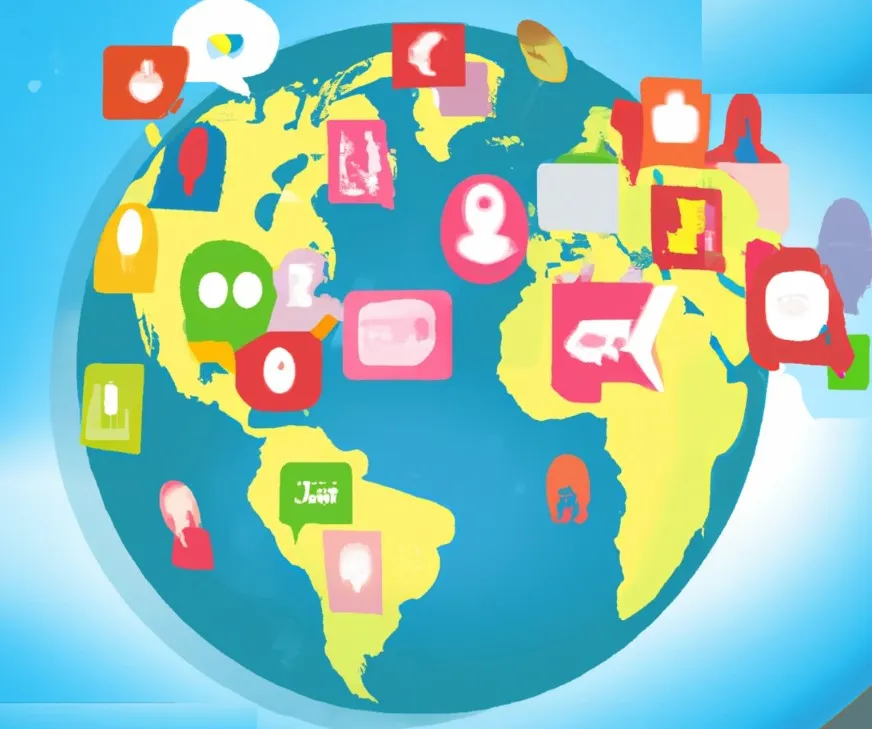The significance of translation in our daily lives is often underrated, despite the prevalence of English as a globally recognized language. With over 330 million native speakers, English still ranks third in the number of native speakers worldwide. When considering second-language speakers, English may be the most widely spoken language globally. All these facts mean that there are still many languages which continue to be more and more widely spoken. All this raises many questions:
- What purpose does translation serve in today’s globalized world?
- How does the growth of non-English speaking markets impact the demand for translation services?
- With the advent of AI and its impact on the translation industry, how will the role of translators evolve in the future?
- What factors contribute to the ongoing importance of translators in the global economy?
- Will machine translators be able to replace human translators? If so, when will that happen?
Keep reading as we dive in these and more topics in the following article:

Translation Services are the key for Global Economic Growth
As travel, commerce and communications improve, translation facilitates global economy. Geographical barriers become less of an issue for businesses expanding abroad. High-quality translation is essential for multinational communication to succeed and grow operations. With the increasing demand for translation services, the importance of translators is evident. Companies can rely on translation services or freelance translators and interpreters for various needs for projects such as birth certificate translations, manufacturing projects, or multilingual software localization.
Acknowledging the importance of translation is essential for businesses and individuals alike. Relying solely on English could limit growth opportunities for companies. Recognizing the value of translation can help view it as a worthwhile investment, requiring qualified translators or translation service providers.
Understanding the significance of translation applied to businesses is advantageous when implemented into businesses processes, and you will require qualified translators for that, or a business that provides translation services.
Translators enable Communication with Native Language Speakers
Language is more than just a means to exchange words; it reflects culture, society, and beliefs. English may be one of the most widely spoken languages, but many people will always prefer their native tongue. Misunderstandings can occur when someone lacks fluency in English, which is why native languages and translation are important concepts in order to spread new ideas, knowledge, and facilitating cross-cultural communication.
As the world’s population grows, languages other than English are gaining importance. Emerging nations contribute to the global economy, and their populations gain access to the internet and other resources. English may not always be the dominant language in the global economy, making translation vital for supporting all languages and promoting inclusivity.
Not everyone speaks English, and reaching out to native language speakers is crucial, as these individuals may understand and communicate in English, but true engagement often requires speaking their heart language. This is where the skills for translators become crucial, as they help people communicate more effectively and bridge cultural gaps.
Smart line USA is dealing in many translation specializations that will assist you.
Translation as the Way to Communicate Through History
Translation has played a pivotal role in the transmission of information and ideas across the world throughout human history. It has enabled cross-cultural communication and allowed people to access knowledge that expands their understanding of the world. Language diversity is not going away anytime soon, it is part of human civilization and it will always be.
The art of translation dates back to ancient civilizations, such as the Sumerians, Babylonians, and Egyptians, who used scribes to translate texts between languages. These early translations often served religious, administrative, and legal purposes, helping to solidify the foundations of organized societies.
5 Most Important Translation use cases trough History
To understand the importance of translation today, we will go through history and examine some of the key example use cases of translation:
- The Rosetta Stone: Discovered in 1799, the Rosetta Stone is a multilingual stele inscribed with the same text in three different scripts: Ancient Greek, Egyptian hieroglyphics, and Demotic script. This artifact played a critical role in deciphering Egyptian hieroglyphics and broadened our understanding of ancient Egyptian culture and history.
- Greek ideals and philosophies were preserved and transcribed through Arabic translators during the Middle Ages. For example, the works of the Greek philosopher Aristotle were translated into Arabic, preserving and expanding upon his ideas. These translations would later be translated into Latin and reintroduced to the Western world, sparking the European Renaissance.
- The Bible has been translated into approximately 531 languages, enabling the spread of Christianity across the globe. Similarly, the translation of Buddhist and Islamic texts has played a significant role in the propagation of these religions. Martin Luther’s translation of the Bible into German in 1522, made the scriptures accessible to ordinary people, fueling the Protestant Reformation.
- Translation of literary works, such as the works of William Shakespeare, Fyodor Dostoevsky, and Gabriel Garcia Marquez, has allowed for the sharing of stories, ideas, and cultural perspectives across linguistic and geographical boundaries. These translations have enriched the global literary landscape and fostered cross-cultural understanding.
- Translation during wartime of intercepted messages, codes, and communications has played a critical role in military intelligence and strategy. Notable examples include the deciphering of the Enigma code during World War II and the translation of Japanese diplomatic messages in the lead-up to the attack on Pearl Harbor.
5 Most Important Translation Use Cases Nowadays
Considering these examples throughout history, the importance of translation jobs is now more evident and recognized than ever:
- Youtube Videos, TED Talks, Movies, Music… Translation emphasizes culture, making art accessible to audiences worldwide.
- The role of translation in facilitating international cooperation and cross-cultural understanding is more important than ever.
- Sports teams and organizations can expand globally by overcoming language barriers through translation.
- Translation in international diplomacy and law: The translation of treaties, agreements, and other legal documents has been crucial in international diplomacy and the establishment of global legal frameworks, such as the United Nations Charter and the Universal Declaration of Human Rights.
- During the COVID-19 pandemic, translation played a crucial role in disseminating vital information, facilitating international collaboration, and ensuring access to healthcare resources across diverse linguistic communities.
Is Translation a Job for a Machine or a Job for a Human?
As technology advances, the potential for artificial intelligence to replace human translators is becoming more threatening. AI-driven translation tools are becoming increasingly accurate and efficient, offering near-instant translation capabilities. While these technological innovations may eventually lead to a decline in demand for traditional human translators, the need for communication across different languages will continue to be a vital aspect of global interactions.
Predicting the exact timeline for AI to replace human translators is challenging, as the pace of technological development can be unpredictable. It may take several decades before AI reaches a level of sophistication that allows it to seamlessly handle all aspects of translation, including cultural nuances and industry-specific terminology. Until then, human translators will remain an integral part of the translation process, working alongside AI technology to deliver accurate, culturally sensitive, and high-quality translations.

Will Translators be Entirely Replaced by AI in the Near Future?
Despite the impressive progress in AI-based translation systems, there are still areas where human translators excel, such as understanding cultural nuances, idiomatic expressions, and the intricacies of specific industries. As AI technology matures, it is likely that human translators will need to adapt and specialize in areas where machines struggle to match their expertise. Ultimately, embracing the collaboration between AI and human translators could lead to an even more effective and efficient translation industry, ensuring that communication across languages remains strong and inclusive.
Despite the rapid advancement of AI in the field of translation, it is unlikely that human translators will be entirely replaced in the near future. The complexities of language, culture, and context require a level of understanding and empathy that AI has yet to fully grasp. Furthermore, the ability of human translators to adapt and specialize in areas where machines struggle will continue to be essential in various industries and scenarios.
Conclusion
The importance of translators and translation services in today’s globalized world cannot be overstated. By investing in translation, businesses can reach new markets, establish mutual understanding with partners and clients, and promote the transmission of information and ideas across cultures.
With the continuous growth of the global economy and increasing interactions between people from different linguistic backgrounds, the demand for translator skills and translation specializations is only set to rise. Recognizing the value of translation and embracing its importance will ensure effective communication and create a more inclusive global community.



